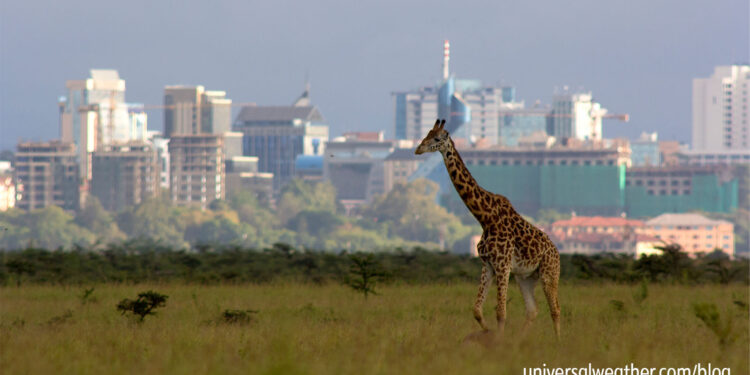Business Aircraft Ops to Nairobi, Kenya – Part 3: CIQ, Security and Local Area

This is a post by authors Victoria Swai and Hussein Maulid Qubah. Victoria and Hussein work for Kilimanjaro Aviation Logistics Centre (KALC), a subsidiary of Universal Weather and Aviation, Inc. which is headquartered in Mwanza, Tanzania. Victoria and Hussein are experts on permits for the African region and can be contacted at victoriaswai@universalaviation.aero or husseinmaulidqubah@univ-wea.com.
This business aviation blog post continues from our article last week, entitled “Business Aircraft Ops to Nairobi, Kenya – Part 2: Permits & Slots.”
General aviation (GA) operations at Nairobi (HKJK) are not given priority over scheduled commercial traffic in terms of customs, immigration, and quarantine (CIQ) clearance. So, it’s important to work with your ground handler, prior to arrival, to try to avoid having to clear CIQ at the same time as vast numbers of commercial airline passengers.
If operating your business aircraft to Nairobi via HKJK, the following is an overview of what you need to know:
1. Customs and immigration
CIQ at HKJK is cleared within the main commercial terminal, and there are no separate or dedicated lines for GA. There will be times, when commercial arrivals are being cleared, that GA operators will need to wait. Customs will advise your ground handler when scheduled commercial flights are to be cleared and ask operators to wait until this clearance is accomplished. Normal procedure is for the ground handler to escort passengers/crew to the CIQ location for security screening and customs/immigration clearance. Clearance time depends on how many passengers and how much luggage you have on board and whether or not a commercial flight is clearing at the same time.
2. CIQ documentation
To clear CIQ at HKJK arrival cards must be filled out, and information requirements vary depending upon passenger/crew nationality. Most nationalities, other than citizens of certain African countries, require visas prior to arrival. While it’s possible for certain nationalities to obtain visas on arrival, these options should always be confirmed with your handler in advance. Note that passport validity must be at least six months from your arrival date in Kenya.
3. Tech stops
For tech stops at HKJK, security screening, CIQ clearance or visas are not required, so long as no passengers or crew embark/disembark. Be aware, however, that your aircraft and documentation is always subject to inspection.
4. Security concerns
Airport security and airside access controls are good at HKJK. While dedicated aircraft guards are not permitted to be sourced from 3rd-party security companies, you may request additional aircraft security from the airport authority. Arrangements for supplemental aircraft security at HKJK should be requested well in advance of the day of operation. Due to security concerns in Nairobi and Kenya – there have been significant terrorism attacks recently – it’s important for operators to always obtain up-to-date security briefs for the airport, city, and hotel.
5. Hotel options
There are plenty of good hotels, including large international chains, in downtown Nairobi as well as close to HKJK airport. Expect to pay $200-$300 per night for 4- and 5-star crew accommodations. Most airport hotels in the vicinity of HKJK airport provide shuttle services to/from the airport. Many crews opt to stay close to the airport, to avoid traffic jams into/out of the city.
6. Local transport/security
It’s recommended to consider obtaining secure pre-paid transport (car with driver) for passenger and crew transport to/from the hotel or city center. Airport hotels are often able to set up transfer services for you for and these services are considered safe. The hotel areas in downtown Nairobi is generally less safe than at major chain hotel properties near the airport. While road travel from the city center to HKJK can be just 15-25 minutes in some cases it can take as long as two hours, particularly during heavy traffic periods of 0600-0900 and 1500-1600 local.
7. Traveling with weapons
Be aware that Kenya is very restrictive in terms of GA aircraft and weapons. When operating to or through Kenya it’s prohibited to carry guns and/or ammunition. If you’re traveling with weapons for hunting purposes, even transiting Kenya on an international tech stop, you must submit a complete list of weapons/ammunition, along with serial numbers and permits/licenses, in order for authorities to determine if they will or will not allow them into or through the country.
8. Avoid public transport
Public transport in the Nairobi area – including taxies and buses – should be avoided. Be particularly careful to avoid “Matatus” – the ubiquitous local mini-buses which usually seat 14 – 24 and sport extravagant external paint schemes. Matatus are notorious for their poor safety records and overcrowding.
9. Frequently visited destinations
At an elevation of 5889 ft HKJK and Nairobi have a pleasant subtropical highland climate. Known as “The Green City in the Sun” Nairobi has lots to offer overnighting crew in terms of museums, art galleries and sights. This is one of the few cities in the world with a national park within its boundaries. Always be aware of your surroundings and be vigilant in terms of petty crime. Avoid traveling with much cash, jewelry or showy electronic devices as pick pocket risks are present. It’s best to not walk around at night alone, due to high crime in the Nairobi area.
10. Additional Reading: Nairobi, Kenya operations – Series Index
Note: Links will be updated as articles are published.
- Part 1 – airports and services
- Part 2 – permits and slots
- Part 3 – customs, immigration, and security
Conclusion
Aircraft and personnel security is always a key concern when traveling to Kenya or HKJK, particularly with the recent terrorist events that have been in the news. It’s always recommended to order city, airport and hotel security briefs prior to each trip and to talk with your ground handler for insights on current security threats and threat mitigation options.
Questions?
If you have any questions about this article or would like assistance planning your next trip to Kenya, contact husseinmaulidqubah@univ-wea.com.




